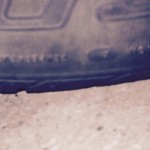I sit at the roadside;
The driver changes the wheel.
I don’t like where I’m coming from.
I don’t like where I’m going.
Why do I watch this wheel change
Impatiently?
This poem, by German playwright and poet Bertolt Brecht, catches that feeling of being in-between. In process. In liminal space.
We all know about sitting idly by, watching.
The poem reflects a moment of insight. An epiphany. Dissatisfied with where he’s been; dissatisfied with where he’s going; the speaker in the poem suddenly realizes the absurdity of his impatience to get to a place he doesn’t want to go.
The poem mentions changing a wheel, not a tire, which is a bit odd. The German word for “wheel” is rad, as in “radius.” Brecht uses this word, not the word for “tire,” reifen. I suspect that’s because he has glücksrad in mind, “wheel of fortune,” that fatalistic Medieval notion that when you’re up you’re up and when you’re down you’re down, and the wheel just keeps on turning.
Why do we sit impatiently, eager to get where we don’t want to go? Habit, for one.
After all, habit means you don’t have to think about it. Thinking outside of the box, or off the road you’re on, is difficult work. It’s easier not to think about it. It’s easier just to go to the place you’re already headed, even if you know you don’t like it all that much. Or at all. It’s the street of least resistance.
The chances that we will change a habit once we have started it is one in ten. One in ten. As the poet John Dryden said, “First we make our habits, and then our habits make us.
Why do I watch this wheel change
Impatiently?
THE OBSTACLE IS THE . . . WHAT?
The Roman Emperor and Stoic philosopher Marcus Aurelius often found himself on the roadside watching a wheel getting changed. He knew the impatience to be where he didn’t want to go.
Stoicism teaches that this liminal space offers the opportunity for decision. Marcus Aurelius said, “What stands in the way becomes the way.”
“What stands in the way becomes the way.”
Stoics begin with the assumption that there are roadblocks. That’s how things are. Stoics advise to take a good look at the impediment. If it can’t be removed, learn to live with it. If it can, then move it.
The Stoic philosopher Epictetus advises, “For heaven’s sake, practice being yourself in the small things, then work up to the large.”
Epictetus also offered some advice for that impatient person by the roadside in the Brecht poem: “First tell yourself what you want to be, then do what you need to do.”
Stoicism has no time for a statement such as,“I’m not the kind of person who . . .” You can’t change the fact that wheels need changed. You can change the kind of person you are.
Here’s the thing: we’re all always sitting by that roadside that Brecht describes. We do or don’t like where we have been. We do or don’t like where we are going.
What matters is the choice we make in that moment as we watch the changing of the wheel. We can choose to go on to somewhere we don’t wish to go.
Or, we can choose something new. Different. Non-habitual. Un-characteristic.
We can choose habit. Or we can choose possibility. As the Stoic emperor put it, “It is not death we should fear, but never beginning to live.” 











